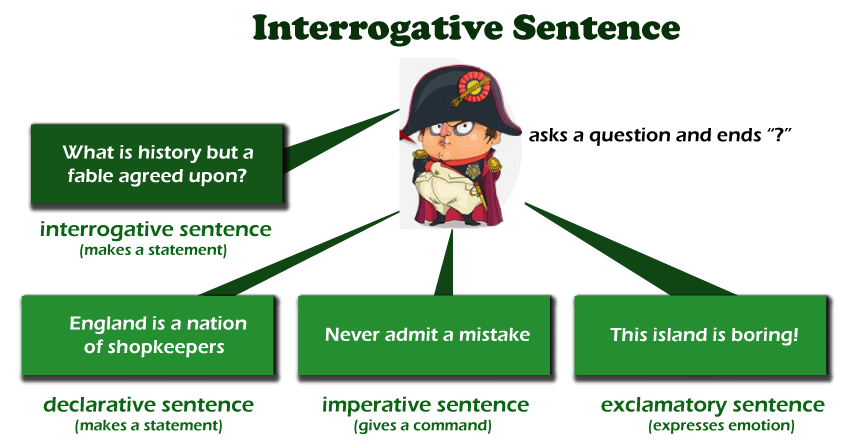Definitions
Definitions 2
Interrogative Sentence DefinitionIntroductionA sentence that asks a question to learn more about something is known as an interrogative sentence. It might be general or detailed inquiries regarding anything at all. An Interrogative Sentence's DefinitionThe Cambridge Dictionary describes an interrogative sentence as "a sentence that asks a question, makes a request for information." An interrogative phrase, as defined by the Collins Dictionary, is one "denoting a form or pattern used in asking a question." A sentence with the "for5m or force of a question" is described as an interrogative statement in the Merriam-Webster Dictionary. 
Examples of Different Interrogative SentencesInterrogative sentences, which are often used to inquire about something, may be divided into three categories:
1. Choice ExercisesThese interrogative phrases can be useful to learn more about a person's preferences and likes and dislikes. For instance:
2. No/Yes questionsAs the name implies, only yes or no responses can be provided in response to this kind of interrogative statement. For instance:
3. 'Wh' Words in the QuestionsWhen you want to learn more than a simple yes or no, you employ these kinds of interrogative statements. 'Wh' terms like what, where, when, why, whom, which, whose, and how start these phrases. For instance:
Some important points to remember while Using Interrogative SentencesNow that you are aware of the many interrogative sentence kinds, let's look at a few things to keep in mind while creating interrogative phrases. Use an auxiliary verb, a modal verb, or a capital-letter-only question word to begin the interrogative phrase. Put a question mark at the end of the interrogative statement. This is also how one may recognize an interrogative statement for the first time. A declarative sentence's structure is somewhat inverted for an interrogative statement. Auxiliary verb, main verb, or modal verb + subject + main verb (if there are many verbs in the sentence) + remainder of the sentence is how an interrogative sentence is structured. Interrogative Sentences and Their UsesAlthough asking a question is the primary function of an interrogative sentence, interrogative sentences are capable of much more. The purposes or uses of interrogative phrases are listed below.
Interrogative Sentences ExamplesTo have a better understanding of how to correctly employ interrogative phrases, look at the examples below Direct question-asking
Looking for more information
Confirming a statement
Information gathering
Can you explain the steps for making these cookies?
Next TopicJurisprudence Definition
|
 For Videos Join Our Youtube Channel: Join Now
For Videos Join Our Youtube Channel: Join Now
Feedback
- Send your Feedback to [email protected]
Help Others, Please Share










